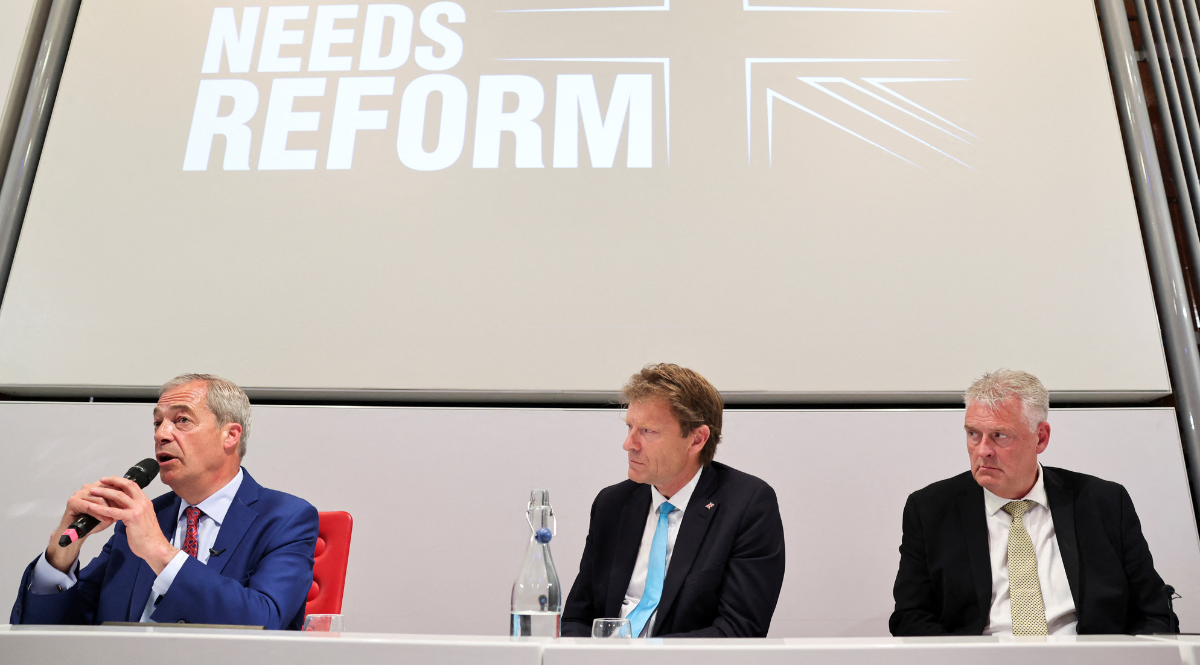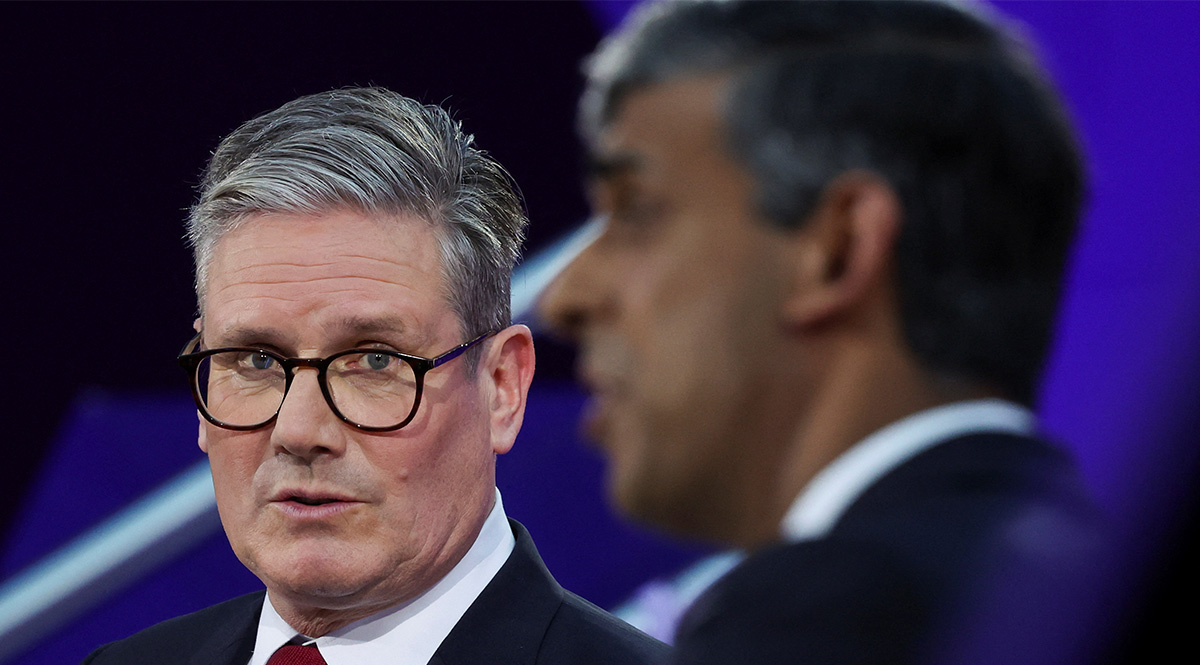Support for Anti-Establishment Parties Rising in Britain
Although the General Election on 4 July ensured Labour’s dominance in the House of Commons under Keir Starmer’s premiership, the result as measured by the number of votes is challenging the government and the political establishment as a whole. The systemic parties (Labour, Conservative, and Liberal Democrat) have all lost voters to forces that have been up to now on the fringes of the party system (Reform UK, Greens, Muslim Voice). With many of their demands concerning the international sphere (e.g., immigration, Israel and the war in the Gaza Strip), their continued success will condition the Starmer government’s foreign policy.
 Belinda Jiao / Reuters / Forum
Belinda Jiao / Reuters / Forum
The British first-past-the-post (FPTP) electoral system based on single-seat constituencies deprives some voters of representation in parliament. Ensuring stable one-party majority rule, which is considered the norm, while preserving the democratic legitimacy of the system requires the Conservative and Labour parties to gather together around 80% of the vote. Failure to meet this condition undermines the democratic mandate or stability of government.
Election Result
In the 2024 General Election, Labour and the Tories won together only 57.55% of the vote (the lowest result ever), giving Labour its most disproportionate victory ever (63% of seats for 34% of the vote). Starmer’s party lost 570,000 votes compared to 2019, but won 411 out of 650 seats (an increase of 211). The Tories lost 7.14 million votes (winning 121 seats) and the Liberal Democrats 177,000 (winning 72 seats). Only forces previously marginalised on the British political scene saw an increase in support despite a fall in turnout to 59.9% (the second-lowest result ever). Reform UK, led by Nigel Farage, won 4.1 million votes (+3.46 million) and 5 seats; the Greens, 1.94 million votes (+1.1 million) and 4 seats; and independent candidates supported by The Muslim Vote platform won around 0.5 million votes and 5 seats. Anti-establishment forces blocked the victory of the systemic parties in a total of about 180 constituencies, and in about 150 constituencies they came second, gaining strong starting positions for the next election campaign.
Changes in the Party System
The long-term, gradual decline in membership of mainstream parties (to 50-250,000 instead of hundreds of thousands/millions) at present makes it already difficult for them to conduct intensive national election campaigns. While in the 20th century 60-75% of the constituencies elected representatives of the same party for several to a dozen election cycles (safe constituencies), in the 21st century that proportion has dramatically fallen. This has increased the number of constituencies where intensive local campaigns need to be conducted (marginal constituencies), despite shrinking resources. The 2015-2024 election campaigns also highlighted the—previously exceptional—mass movement of the electorate (initially from Liberal Democrats and Labour to Tories, now from Tories to Reform UK, Labour and Liberal Democrats).
In case of the 2024 General Election, the key changes in voting behaviour are due to inconsistent adaptation by the Conservatives to socio-demographic trends. In 2015-19, the Tories sought to capture socially conservative, pro-Brexit Labour supporters from (post-)industrial constituencies in the North and Midlands of England and Wales (Red Wall). At the same time, the support of the younger part of the metropolitan middle class was shifting from the Conservatives to Labour and the Liberal Democrats, gradually leading to the collapse of the Tory strongholds in the South-East England in 2024 (Blue Wall). Had the Conservatives continued to adapt to these social changes (as they did in the 2017 and 2019 campaigns), they could have led to an exchange of electorates between Labour and the Tories, ultimately strengthening the duopoly on the political scene. However, they failed to do so because of errors in electoral strategy and Starmer’s extremely cautious tactics, directed at winning broad support from the radical left to the moderate wing of the right.
Fields of Competition between Systemic Parties and Anti-Establishment Forces
The Tory collapse is primarily due to a mass exodus of their 2019 voters to Reform UK (50% of the vote transferred to other parties) or voter absenteeism. Key programme issues for them were the Conservatives’ failure to curb immigration, contrary to promises made since 2010 (immigration has been controversial on the back of issues of social inclusion, pressure on wages and public services and border control) and the high cost of living (especially energy prices). Competing not only with the Tories but also with Labour was Farage’s offer. Reform UK’s platform supported, among other things, the suspension of the European Convention on Human Rights (ECHR) to speed up the deportation of immigrants illegally entering Britain, repeal of the law inherited by the UK from EU membership, tax cuts, and questioned the high socio-economic costs of the green transition.
Significantly, Farage’s offer remains potentially attractive to many traditional Labour voters who supported the Tories in 2019 to vote Starmer on 4 July. This is evidenced by the fact that Reform UK came second in 89 Labour-dominated constituencies. On its left wing, on the other hand, Labour is vulnerable to competition from the Greens (who came second in 40 constituencies) and Muslim Vote candidates. The Greens proposed, with the youngest voters (18-25 years old) in mind, a radical acceleration of the climate transition, winning 18% support in this group. Another source of their success was the most pro-Palestinian platform of all the parties (including support for an immediate ceasefire and the withdrawal of arms export licences to Israel over allegations of war crimes), posing a direct challenge to Labour’s left-wing. An anti-Israel and at the same time socially conservative agenda (e.g., on LGBT issues) was represented by independent Muslim candidates running in some 30 Labour constituencies. Labour’s share in the British Muslim community’s vote has fallen from over 80% to around 60% in relation to 2019.
Conclusions and Perspectives
Electoral support for Labour’s “loveless landslide” is broad but uncertain, as was in case of the Tories’ win in the 2019 General Election. Moreover, Starmer’s victory would not be possible without the votes of some of the socially conservative, pro-Brexit voters lost by Labour in 2019. The Starmer government must therefore make difficult policy choices at the risk of losing voters on both flanks. The Conservatives, meanwhile, have to decide to what extent they will focus on competing with Reform UK for right-wing votes and with the Labour and Liberal Democrats for centre-left votes. Importantly, the Liberal Democrats managed to win 64 additional seats thanks to the support of around 1.2 million people voting tactically against the Tories as well as concentrating their resources in constituencies where the Conservatives were weak.
By contrast, if Farage wants to compete effectively for leadership on the right, he needs to expand his party’s local structures. During this period, it will be crucial for the Reform UK Party to highlight the differences in its programme from that of the Tories. In turn, the desire to reunite voters on the right will be forcing the Conservatives to bring the issue of the suspension of the ECHR, among others, into the mainstream debate. Reform UK’s participation in the parliamentary debate will also generate pressure on Labour on the issues of immigration and the green transition. The success of The Muslim Vote, in turn, increases the risk of sectarianism in British politics in the medium to long term (an organised Muslim minority could determine the distribution of seats in up to 100 constituencies). Although ultimately the Greens will be a programmatic challenge to the systemic parties, their current success resulted to a great extent from the pro-Palestinian stance.
Those supporting anti-establishment forces were distinguished by programme preferences relating directly to foreign policy. For Reform UK voters, immigration is key. From an EU perspective, this issue will directly influence the UK’s stance in the talks with the EU on a cooperation agreement in the broader field of foreign and security policy (e.g., readmission of immigrants, access to the Schengen Information System I and II databases, or energy security). Importantly, Farage’s demand for the suspension of the ECHR directly contradicts the principles of the Cooperation and Trade Agreement. The cost-of-living issue (important for Reform UK voters), coupled with the speed of the climate transition, which is crucial for Green voters, will influence the positioning of the UK vis-à-vis the EU, the U.S., and China in the global green transition (e.g., the issue of tariffs on Chinese electric vehicles, investment in next-generation industries, or the nuclear programme). Finally, the Starmer government will come under increasing pressure to halt support for Israel. Anti-establishment forces will also undermine the British consensus around support for Ukraine.





.png)